Book contents
- Law and Jewish Difference
- Cambridge Studies in Law and Society
- Law and Jewish Difference
- Copyright page
- Contents
- Acknowledgements
- Chapter One Introduction
- Chapter Two From Jewish Other to Citizen of the Mosaic Faith
- Chapter Three Contentious Cut
- Chapter Four The Body of the Other
- Chapter Five Dividing Lines
- Chapter Six When Orthodox Judaism Goes Public
- Chapter Seven Persistent Ambivalence
- Bibliography
- Index
- Cambridge Studies in Law and Society
Chapter Seven - Persistent Ambivalence
Concluding Thoughts
Published online by Cambridge University Press: 14 November 2024
- Law and Jewish Difference
- Cambridge Studies in Law and Society
- Law and Jewish Difference
- Copyright page
- Contents
- Acknowledgements
- Chapter One Introduction
- Chapter Two From Jewish Other to Citizen of the Mosaic Faith
- Chapter Three Contentious Cut
- Chapter Four The Body of the Other
- Chapter Five Dividing Lines
- Chapter Six When Orthodox Judaism Goes Public
- Chapter Seven Persistent Ambivalence
- Bibliography
- Index
- Cambridge Studies in Law and Society
Summary
By way of conclusion, this final chapter briefly discusses the Flemish ban on religious slaughter without prior stunning, which was confirmed by the Court of Justice of the European Union in 2020, and restates the main arguments of the book. Moreover, I take the Flemish case to briefly outline three further questions that have emerged from the story this book has told. These questions relate to the relationship between Christian ambivalence and legal progress, the role of Jewish engagements with secular law, and the entanglement of Jewish and Muslim questions in the contemporary politics of religious difference.
- Type
- Chapter
- Information
- Law and Jewish DifferenceAmbivalent Encounters, pp. 218 - 238Publisher: Cambridge University PressPrint publication year: 2024

